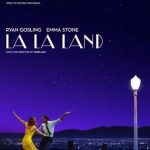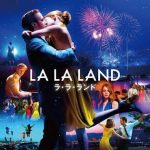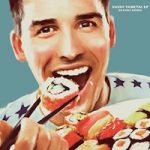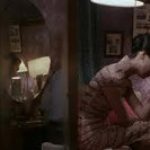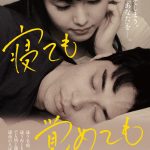Date: 2018 May 10th
Place: West Village, NYC
Interviewer: Joe Onishi
――How have you started music in general?
CL: First Love is like 11 or 12 got into Slayer and Megadeath and then through that, more extreme metal right away, Morbid Angel, Napalm Death, Earache Records 90s stuff, death metal, grindcore, that kind of stuff. At the same time, punk in general, conservative stuff or mainstream rock, mainstream alternative rock at the top of the time.
――Also indie rock or something?
CL: There’s always been a melodic side, which is kind of more neo romantic, post punk, English goth, new wave stuff, always melodic element and then story of complex, dissonant, technical weirdo side of thing, through death metal, through modern classical composition. When I was at high school, I was not singing yet and just a guitar player, I really got into all these abstract difficult form of music, jazz, modern classical music, free jazz, improv, noise, industrial, all the weirdo shit at once. And then throughout my 20s, start playing Zs.
――As a teenager you worked for Knitting Factory? Listening to lots of stuff there perhaps?
CL: Talking of quantum quote “downtown music” (hereinafter, “downtown music”) specifically through John Zorn and knitting factory in the 90s, that was a big introduction for me. Not just the idea of experimental music, but the idea of being a musician who does not operating one genre, crosses genre, defies genre, blends genre, makes hybrid forms. They are like the first scene that was super inspiring to me.
――Not a style, just a philosophy or principle of it.
CL: Not much the sound of downtown music, but the attitude and the idea of just being musical omnivore, And then being able to synthesize that into something that actually make sense. It is not just like Frankenstein creature you know. Although a lot of that downtown music has Frankenstein nature of it,.
――But almost it’s gone now, especially these days right?
CL: I wasn’t gonna say that but since you say that I am not gonna contradict that. John Zorn himself is very much not gone. And its original generation, people from the 80s and 90s those folks are still making amazing music so that’s not gone, but when you say it’s gone, you mean like younger generations are not as much hopping on that I guess…
I guess for me, as a teenager, I looked up to that scene but when I started to get involved in really playing, playing out in New York and being a performer, actually making records and getting out there in my 20s, Zs was my first group I did that with. By the time I was doing, I didn’t feel like Zs was part of “downtown scene”. We all liked Zorn, Marc Ribot, we liked that generation, but we are not really part of that so much .We are more part of like 2000s Brooklyn DIY that kind of punk, noisy punk kind of guitar rock.
――So you are also joined in Dirty Projectors as well,
CL: Yeah that was more part of Brooklyn 2000 indie music. As far as indie meaning just a guitar bass music, comes from a band ethos that pull 2000s Brooklyn DIY scene. It was band culture oriented which means coming out of 80s hardcore and 80s punk and less out of a John Zorn kind of “downtown scene”.
Is “downtown scene” over? You did mention this phrase for this magazine so it must be not that dead right?
――Not that much. So that I feel that we need to reconnect and want to see the contexts in more detail. Because you performed with, for example Trevor Dunn and Jeremiah Cymerman so.
CL: Absolutely. And there is a person who I personally don’t know but I respect a lot, Tyshawn Sorey, very much carrying that sort of, tell me you call that scene or tradition or that ethos but it still exist But maybe it’s not marketed in a same way or something.
――Outside NY, from the country like Japan, of course it seems that there are a certain musical context or background.
CL: No matter how far out and freaky they make music, a lot of time it does get contextualized and perceived and get funneled into pretty specific genres and associations, whether it is Zorn and Anthony Coleman in 80s and whether its Jeremiah and Trevor Dun now. Either way lots of artists, they might make a record that sounds like total electronic noise music or something, But it ends up just getting contextualized along with “JAZZ”. You know its rounded to jazz “oh this like a its freaky far out form of “JAZZ” and everything come with that. “Musician’s music”, “virtuosity”, “certain intellectualism” etc.
On the other hand, take that Brooklyn DIY thing where Zs came up, Extra Life came up, and I came up. People can do the craziest music on earth and ends up getting contextualized as “Rock”.
Zs really got off on that. We really got off on that thing of hyper thorny, downtownish kind of music, but we are doing it with saxophones and music stands and all this kind of “virtuosity” and “intellectualism” etc. but we are doing it in DIY Brooklyn rock sort of punk context. People fucked up on drugs in 2 in the morning. People are sweaty. So, there is some kind of cross thing there.
――How did Wesleyan College treat you?
CL: I loved going there. General liberal arts education is really ridiculous and funny thing to do. Highly debatable what is really going on there. I really learned a lot from Anthony Braxton.
――He taught there right?
CL: He recently retired but he was there. He is just maverick, genius with his whole own world music. I don’t really absorbed directly into my own any particularly way, but just being around. I took his ensemble, he runs his large ensemble which was trip. Especially at that point, I was very, very into experimental, purely instrumental music. I was not singing yet. It was big switch for me. After Zs I started singing in Extra Life, that’s why all of the melodic elements and new romantic elements and Morrissey elements and all the Medieval elements and Early music elements started to come in, my 20s after Zs. But in college, I was commuting into the city from Wesleyan to play with Zs. Anthony Braxton is super important to me at that point.
Culturally to me, the big difference between something like the downtown scene and something like the world of Anthony Braxton. The difference between those kinds of worlds and other hand, so called DIY scene, so called 2000s Brooklyn scene or the metal scene whatever. Difference is that it seems downtown music, jazz music, improvised music, it really ends up being musician’s music a lot of the time. And it really ends up like being by, for and about the musicians, which is not necessarily a bad thing, but it’s just a very particular thing. You have a crowd, everyone in crowd is a musician. And that is different from basement shows and loft shows that happening in Brooklyn in that decade. There are musicians playing bands but also lots of other people hanging. I like that. Zs when I get up into shows where everyone is wearing neon stuff, bunch of crazy broken pedals, we get up there with music stands. We kind a enjoy that you have a room of people thinking “Oh Sheet music. what is that!” While sheet music at the Stone, people are like of course, these are “music for musicians”. So there is a difference. Just different culture.
CL: But I feel there are still some artists kind of represent downtown NY in a way. I feel like Anohni (Antony and the Johnsons), she is not like super experimental but I feel like she does represent, still holds a torch for that kind of old school New York.
――What particular elements or character does she have for old school NY?
CL: Well, I guess the history of NY downtown culture has many sides to it. I wouldn’t say Anohni ever exactly represented the John Zorn/improv/composer side of the scene, but she came out of the experimental theater side of it, the cabaret-influenced vibe, the art-world thing that overlaps with fashion, performance art, and also the queer, trans, and drag cultural currents within that, the experimental mining of the torch song tradition. Like the post-Warhol thing, people like Penny Arcade etc. That’s a slightly different facet of the city’s history, which I’m way less knowledgeable about, but it’s distinctly New York and downtown. When she first came out with Antony & the Johnsons, her New York-ness was more overt I think.
――You did play at the Stone recently, I mean a couple of years ago. You did a guitar quartet show at The Stone with Mary Halvorson, Mick Barr, and Tyondai Braxton. Could you tell us about your relationship with Mary Halvorson and Tyondai Braxton especially?
CL: I’ve known Mary since we were teenagers, even though she’s from Boston. One of the deepest and most original guitar players I’ve ever known. My relationship to the Jazz scene is pretty minimal, almost non-existent, however I’m proud to say that the small handful of Jazz artists who I collaborate with really are some of the finest of our generation, including Mary, as well as Darius Jones, and Mike Pride. Mike and I have an improvising project that plays off-and-on, called PERIOD. Mary and I will occasionally get together and jam every couple of years, sometimes at a show.
As for Tyondai, I’ve known him almost as long as I’ve known Mary. Ty is a prince. We had a very short-lived noise-rock/no-wave kind of trio in 2000 called Antenna Terra, with Mike Pride. We never recorded, but it sounded like U.S. Maple, but with more of a metal/New York Hardcore flavor. In 2011-2013, I was playing guitar in the live performances of Ty’s orchestral record “Central Market”. I was in the the core electric band, along with bass and drums, and we did concerts with the LA Philharmonic, and the London Sinfonietta.
――How come you started singing while you are doing so many complicated stuff on guitar?
CL: Extra Life certainly has all kinds of crazy guitar shit happening. Singing is very different from playing an instrument. A lot of people are going to disagree with that, especially seriously trained vocalists, but there are some differences because when you are singing words, there is no way not taking up huge amount of your perception of the art. Even you don’t care about the words, even if you throw away lyrics or whatever, that takes it to this realm of representation and makes less abstract or more abstract how you defending on how you feels up with using that word, but you get into representation, narrative, your personality as a singer. Even if you are singing music which does not have words, if you like Cocteau Twins and you are singing syllables, even then, the absence of words is conspicuous because people associate singing with words and storytelling and communication. People think f it is more immediate than playing instrument even if it is technically not. It’s coming from your mouth not from your hands. The instrument is literally your body, which is heavy. Actually having your body be the instrument as a vocalist. Of course this is pretty much overly intellectual explanation to rather than saying “I love singing did it in shower”. That is more human answer than I just like singing. Just with Zs, getting into this realm of abstract difficult music, I just wanted to pull it back to fuse that with more direct emotional immediate thing that I was always into as a younger person.
So Extra Life was really like an wholly union of the romantic vocal aspect than sort of more alienating technical instrument aspect.
――How do you make music for Extra Life, what is the creative process is like? Lyric first or music comes first?
CL: Usually lyric first and then music, Some of stuff I wrote out, I wrote parts for all the instruments for everybody’s part including the drums you know, notated down to the every note. Some of the other songs are collaborative. Like I would write a song, the other musicians come up with their parts. So some of it has a composer process and some of it was more of a songwriter process. Extra Life, we never made it to Japan, although we played in Europe.
After disbanded Extra Life, my idea of next phase is more direct, simpler, still some complicated music, but more like, in a rock. Concise song writing. More directly guitar based stuff. It just more like a return to my roots of what I really into. Just doing more emotionally direct. More rock and metal element. And doing stuff on my own name, super really weirdo shit, which is what I talking about this record coming out now.
――When you are making rhythmically complicated stuff, what is your procedure is like?
CL: Any kind of complexity, technical complexity or intellectual or conceptual complexity for its own sake is unhealthy. If you really wanna trip out on this, complexity for its own sake is kind of disease of capitalism or whatever you gonna call it (laughs). It is cancerously emptying out human out of humanity. You really got into complexity for its own sake, you would really rather replace human with fucking AI. So that I am reluctant to jerk off that complexity. Everything I do end up has some sort of complexity, but it is not like what that make something good. I just get joy and energy and vitality out of just whipping out of shit.
I have only recently started to really noticed the reason why I love metal even since I was 11 years old. They are dealing with really complicated stuff, about black metal too but really specially death metal. So many bands and artists who are doing beautifully complex interesting stuff harmonically, riffs and rhythm, and playing purely musical level. So adventurous but presented in this way that is totally non-academic, non-elitist, and very open and there is kind of blue collar working class energy. People playing music on the complexity level like Bartok string quartet. A lot of people didn’t set foot in college for a minute and no snobbery about it.
――For example, have you ever tried to make music using 12-tone?
CL: 12-tone music is essentially like communism right? It’s a systemically imposed, egalitarian, absolute form of raveling that is conceptually very interesting and then when you listen to it, like “this isn’t last that much”. Some 12-tone music’s been very important for me. The work of Webern is especially important, because he stripped down naked elements. But even at the most academic, I was never writing music even with Zs where I was writing purely instrumental music, even that was never system, never like using that. It is always like just aesthetics, just imagination.
――How do you internalized melisma style that derives from Renaissance and Medieval music?
CL: I taught myself from reading Renaissance counterpoint books and exercise on my own stuff. I really got into that music in my 20s and it didn’t come into mix until Extra Life. You couldn’t hear influence til Extra Life when I started to sing. One of the thing I love so much about that music is that, it’s alien but beautiful. It is dissonant but it doesn’t follow conventions of harmony and chord progressions as being known in a modern way. I don’t wanna get too nerdy about technical details, but the way it does unfold melody is very asymmetrical and non-repeating and long. I love that sort of extended uncoiled sort of unfurling of these long melodies that just based on variety not symmetry and not repetition, just change and just balance. It is based on balance than symmetry, that something I like about it. And actually, I like spirit of it. There is solemn beauty to it. On a spiritual level, especially Medieval music,when you get into Renaissance it gets more changes, but Medieval music, it is projecting maybe but there is this sense of man has been very humble, lowly, just a based thing cowering before god.
I don’t believe in god. I don’t practice religion. But something I love Medieval music is, there is a sense of humbleness. These monks are writing chants not even putting their names on it. It’s just anonymous practitioner of this sonic art going on and on with secret context. It’s not part of any kind of commercial concerns, not part of any kind of chord power. It’s just religious. Solemn religious music. It’s a gorgeous thing.
The way how I wrote melisma is pretty intuitive. There are way more of that melismatic writing in Extra Life. I have sort of reined that in a little bit but there is an aesthetic quality to melisma. When you extend a vowel sound, it Is like opening whole representations fabric of the music. It is like you are singing in normal syllables normal syllabic text singing where its not melisma when you are singing that way, you can make out what the words are you are while listening to pure music, you are hearing word and representations. But the vowel opens up and you just stretch that vowel and the meaning is extended and you are actually in the void of meaninglessness, not necessarily negative sense of darkness, but a meaningless means pure sound not representation.
――Pure vocal sound may be?
CL: “Pure vocal sound”, “pure breath”, “pure vocal spirit”. That is what it meant. I know enough about Medieval music and Renaissance, I do know that when you draw out syllables from melisma it has ecstatic moment. Hallelujah is important words when get drawn out.
――”Bled White” (song from Extra Life’s “Secular Works” 2009) is just so amazing.
CL: Thanks for bringing it up, glad you like that. Some of these lyrics I might switch out if I did write again. But the melody I got, that is probably the best thing I have ever wrote, as far as just the pure melody itself. You could play that song just on the instrument without lyrics at all.
There is something funny about melisma. People find it a little comical like even if they like it. Especially like some of the newer stuff I wrote, when you singing something when you drawing out some syllables with melisma, it has ecstatic quality, that has ritualistic quality to it. But the actual word actual lyrics are like just some stuff about like doing coke or getting a blowjob or something. There is obviously kind of fucked up and funny about that and people obviously recognize that. That I don’t get from Medieval music. I get from R.Kelly or something. Who is very aware of serious melisma probably more coming out of Gospel music. Devotional music using its aesthetic vocal thing of melisma but then just you singing about the most bass worldly carnal thing something I do. I think Extra Life relished that kind of irony a little bit.
――What about Seven Teares ?
CL: We only put one record. We will got another one, half of it has recorded. We record a song couple a month. Kind of slow, it’s definitely more of a side project. Occasionally we will do a festival if we will get a offer or something. While Extra Life was happening, I wanted to do something that even more simpler. More acoustic side of what I am into. Its like influence to some extent by Medieval music or early music but less rock more folk. Draw influence from post industrial folk stuff. Current 93 that kind of thing. Technically it’s not that complex, but very weird and challenging, artistically.
Seven Teares, Psalm Zero, New Project, there is always a melodic element that is kind of pop. There is a pop thing even in the weirdest moments, it really that is not a purpose but it ends up in that way.
――Psalm Zero now has 2 members right?
CL: It’s me on guitar, voice and programming. Keith on drums from Kayo Dot. I have known Keith from 13. We actually grow up together. We met through friends of ours like 12 or 13. Ron also is from Kayo Dot, Such great guys.
Most of the next album will be recorded this summer, I just have been consuming Charlie Looker solo album taken whole of my time.
――So, ”Simple Answers”, first solo album listed under your name is coming up. Which, You don’t even disband this project anymore.
CL: I won’t disband anymore, Psalm Zero, Seven Teares, my solo project, everything is going to be a thing.
―― Your solo album is totally different from previous works.
CL: The idea behind this album is “composer” debut album and I mean by composer, in my mind I had pretty specific trappings like classical music or new music contemporary music, etc. I fundraised my money and I did a big kickstarter campaign, cloud funding thing, all raise my money to hire all musicians large ensembles, strings, winds, brass all the stuff.
――Tyondai influenced this project, is that true?
CL: Tyondai was also a big direct inspiration for me in putting together “Simple Answers”. I had been thinking about how I wanted to do some kind of large-scale project with a “classical” ensemble, but I was intimidated by how difficult it would be on a logistical/financial level. Ty was very encouraging to me, telling me to just follow through with writing the actual music, and then think about the practical dimension later. I ended up funding most of the album through a crowd-funding campaign, as well as personal investment, but Ty was the guy who told me not even think about any of that stuff until the musical vision itself was complete.
It turned out be a lot less classical than I intended to be, which is also fine and awesome. But it ended up with having been way more like vocal based album, still revolving around songs. I guess you could call it more of really weird orchestral pop record. But definitely it isn’t classical music, maybe only its elements are. This record is song based but there are instrumentation and orchestral arrangements that is way weirder than usual orchestral pop music.
There are lots of stuff. Song writing is kind of chord progression based and almost pop related, sense of chorus and verses I have all of these sonic thing is going on with ensemble with orchestral instruments that are really noise based or based on extreme dissonance textures from Ligeti or Gerard Grisey or just from like horror movie soundtracks that kind of ugliness shock on and on.
It’s an album consists of 8 songs and somewhat less specifically political than it might seem, It addresses current wave of just call fascism as a shorthand, as a certain kind of violent energy, that‘s gaining fire now. You say fascism you don’t literally mean Neo Nazi or something. I just mean sort of this tendency towards certain like far right wing, not even necessarily ideologies but just attitudes and feelings. Everything is so political right now and I know, I understand why. But I feel like the way people are dealing with politics now everyone feels like, they have to have a belief and an opinion and an ideology. They have to know what they believe and feel, rather than in words. This record addresses fascism and it is kind of anti fascist record, you can say, but it’s not about let’s do this and this is what needs to happen. It’s more dealing with attitudes, emotions, feelings, tendencies,
――Not a message album.
CL: It’s more ”me working my own shit” album.
――So it’s more music or..
CL: More art. I guess. There is a lot in this new record that addresses this sort of “might makes right” attitude and the desperate thirst for just simple absolute answers that give you a sense of wholeness. There really is far right wing energy. I am not even talking about like Donald Trump. This is not even about specific politics, I am talking about people on the internet, generally what people are feeling. I hear a lot of things from the right. I hear real contempt for intellect, and contempt for thought, coming from a point of viewing thought, viewing language as being weakening elements that divide the world and weaken people through divisions and analysis. So while I talk about fascism on the record I am not talking about this specific racism or whatever. I am just talking about worshipping of power and the body as being transcendent and sort of disgust with language, intellect,thought, reflection, that stuff does broil over to Anti-Semitism too. Because people associate Jews with language and laws stuff like fascism in1930s 1940s,you see lot of scapegoating. Anyway, so those are ideas got from Julia Kristeva and to an extent from Umberto Eco.
――Also you mentioned about a comedian Patrice O’Neal with Julia Kristeva. It may seem it is not a joke. What is your intention here?
CL: I have been saying it is based on the work of feminist psychoanalyst Julia Kristeva and American comedian Patrice O’Neal. I am a huge standup comedy fan and he is probably my favorite comedian rest in peace and one of the greatest comedian ever lived. It’s not a joke I mentioned as an influence but say it’s an exaggeration. He is probably the most evil, not him as a human being, but his comedy expresses the views that are technically evil but some of the most evil stuff that I laugh at. I have to admit it’s funny, I can’t deny the level of misogyny and just the level of not shit I believe in. But I have to just face the fact that he is the funniest dude ever. I legitimately admit Kristeva and I legitimately think Patrice as well.
That is just some internal contradiction I had to live with. Not only Patrice though, Bill Burn, even like early Lucie K, they have do with contempt for weakness, contempt for vulnerability. Funny thing about Patrice’s comedy is like, looking at this guy with huge goiter on his neck, and just how he hate this guy having it deformity and stuff. That is just fascist ideology! But the way he makes he expresses that thought is so humane and relatable. He drugs you to laughing. Maybe I am a piece of shit thinking this is funny. It’s totally possible. You know I just been honest.
I do see these connections between that and contempt for weakness and there is this thing distrust the language. Both Kristeva and Patrice O’Neal have, they talk about how language can just collapse into this meaningless void just words stop mattering.
The other thing that is super deep to me is what Kristeva writes about fascism and I used her ideas in lyrics. But fascism is not a central thing she writes. It’s just thing clips here and there, In “Power of Horror” she talks about it, in relation to language, also relates to mother’s body. There is sense of fascism not only rejection of language as being weak, but also nostalgia for mother’s womb, because that is a place of wholeness. Before the world was divided up into concept, before the world is divided up into discrete elements words and stuff.
But she also writes a lot about depression. If people are really suffering from depression, they actually not fully able to speak. She talks about sort of parallels and comparisons between psychology and fascism. In her book “Black Sun”, song in this records called “Black Sun” too, talking about how severe depression have right wing political valance to it. Even though people on the left, talking on their depression on twitter. But if you are really depressed, you start to identify yourself to power itself, you stop resisting and you just disappear into the idea of power. That is something that I relate to not something conceptual level, or visceral, emotional level.
I keep aware of being unable to speak because of the idea of speak seems weak, humiliating, intellectual Jewy thing. There is Anti-Semitic element to it and it needs to be addressed. I am part Jewish so I know the case that people saying ”It’s ok!”, but it’s not ok and it’s fucked up.
――Are your parents Jewish?
Dad is Jewish. Both of my parents are psychoanalysts, so they are somewhat Jewish. Kristeva is talking about Anti-Semitism is being a scapegoating of the idea of the intellect, scapegoating of the language the intellect, thought, reason etc。Limitation of language, rational thought is get blamed on Jew by fascist thinking.
When you are asking whether I write twelve tone music, I made a joke about that it is like musical communism. I heard people talk about how serialism is like communism, jewish perversion of the western canon by introducing overly intellectual system that are not rooted in something more essential.
Whatever fascist says, it is based on blood and soil. It is a kind of album where there is something that I say on if you don’t know what I am all about. You might take it in the wrong way. But I trust people know where my heart is.
――You intended to be interpreted in a lot of way. There is a room for various kinds of interpretation.
I want things open to interpretation but at the same time I am not worried about overly explaining stuff. Because even if I talk on and on, I think lyrics still have a power of ambiguity and polyvalance that people can still take their own thing on it. Even though it’s not a message album, I do feel very strongly one of a thing that frightens me about current political climate of the entire world and what I say political, I am not talk about laws and policies, more talking about cultural war. To me scares me most is the it’s not just extreme schism between left and right it’s the fact it seems to me the far right understands the far left way better than the far left understands the far right.
Lots of people on the left including my friends, they seem to have this attitude that if are able to comprehend intellectually and critically the thought processes of fascism or far right thought, you are already giving it too much credit, and are already being complicit in it. Even Kristeva in 80s got some criticism, fascism dealing with language and nostalgia from the mother’s body, depression.People are like no, fascism means racism if you think it means you are fucking fascism!
You have to intellectually understand, you have to replicate those thoughts on your own mind, you have to actually do “Evil shit” in your head. I am not saying “hey all of the right need a hug”, I am not saying that. Even though if they all do need the hug. Who is gonna hug you If you are fucking sick. Obviously not.
Especially with the Anti-Semitism. You need to know how it works. It’s not good but I get it.
――But probably metal kids are more right wing?
CL: Lots of people in the metal scene, they flirt with right wing shit just be offensive. It’s not only dangerous or not even sincere. People are just doing that. They are lot of people in metal musicians and bands I respect, especially black metal, they are not fascist they are not necessarily right wing, they might be apolitical or not that political. But they are obsessed with mystical vitality, non intellectual, spiritual power, vital force and energy.
You know they get it from Nietzsche. He is not necessarily fascist, but..Talking of Mishima, he is super right wing, it definitely makes sense from his writing to he would go super right wing. Tons of his stuff are not specifically right wing but deals with that kind of stuff, like “Sun and Steel”. Distrusting words is so amazing for a writer to have this kind of contempt for own his medium. And self-hatred. But this guy being obsessed with bodybuilding and muscles, body is just unitary place of power and fire (laughs). It’s funny! If you have sense of humor. That shit ends with suicide. Literally, Hitler ended up with killing himself. So even if you are like Nazi still its not good idea for you because you ended up not even winning. Fire consumes yourself. Mishima ended up committing rituality, Harakiri.
A lot of People feel weak and just obsessed with the idea. Privileged people, who actually are not vulnerable and not weak in society, they obsessed with the idea of regaining some kind of idea of power, that has been lost in the modern world. Heroism, spiritual wholeness, vitality, violence, will to the power whatever, is very dangerous. You’ve got some sense of humor. Idea of wanting to be a warrior or shit. It’s just the idea like languages , thoughts is for just the Jew, just like terrifying but funny.
That sound insane and fucked up, I hope people understand that I mean no harm here. This is for me to workout my own issues. I hope it helps other people. My only hope is that this work as healing for people, honestly.
――In this album, there is a place for people can subjectively think something.
CL: I think there is a room for people to interpret in some say.
――But I am wondering the word “healing”, in this word some kind of wholeness, mother’s body, wholeness are implied and has some kind of right wing energy. Although practically some level of healing is required in daily life.
CL: Good question. If you are Donald Trump healing means build the wall. I guess the general vibe any kind of psychoanalysis has is, there is an idea with in healing trauma, and I suppose there is some kind of wholeness you would return to. I guess how strict you make that.
Even though you pointed out healing fits in an idea of whole, rejecting fragmentation, practical level, all right people are not into psychoanalysis and there is a fact that right wings does not love psychoanalysis typically.
I am also into Bataille’s idea of the ritualized “transgression” in terms of relationship with music and philosophy, when thinking what the role of the music would be. I am not into the idea of transgressive art as a specific thing. I have never been into transgression has a value in itself or anything like that, but for me in a not that extreme way, but actually kind of subtle way, but meaningful to me, when I write lyrics, ritualized and bounded sacred space I get to deal with certain things that is a little bit socially on chord to deal with facebook or twitter. It doesn’t meaning of “let’s say a bunch of fascist shit just because it’s taboo!” Let’s get off on that, it is not the ritualized transgression, it is just being an asshole.
You are actually looking at parts of yourself that are odds at your own values, I mean that is edgy to me. Actually transgressive, going beyond your own personal boundary.Not to try to violate societies’ boundaries but just violating your own personal ideas what you think you like. So maybe that gives you some answer to this thing.
When I say “healing”, I mean more like a ritualized exercising of certain energies, and “exorcizing” demon. take out the demons, clean out the demons. Bataille talks about human sacrifice in premodern society. There is a taboo on violence but once a year cut kid’s head off and rolled it down to temple steps and we exercise those energies using that. Stuff I say is less fucked up than cutting kids head off, but there is a kind of violent, cold blooded, inhuman or evil types perspective of thoughts, attitudes, energies, is on the album have that kind of quality for me. Ritually transgressive personal boundaries.
――What is your next project is going to be? And tell us if you have any plans to perform in Japan.
No more new projects with new name. This summer we gonna record new Psalm Zero album which will come out by the end of year. Under “Charlie Looker”, I have some idea for composition. I am thinking writing pieces, solo flute or solo contrabass with electronics as a composer. I will perform in Japan by Psalm Zero soon, hopefully.
Ecrit-O is a cutting-edge indie cross-cultural magazine in Japan and the biggest & finest in this category. We write about Literature, Art, Film, Music. Past Interviewees include Nicolas Winding Refn (film)、Maiko Endo(film)、Atsuo (music, from Boris).




